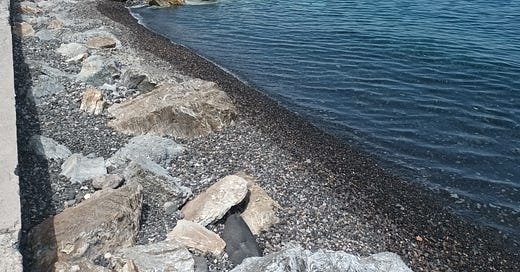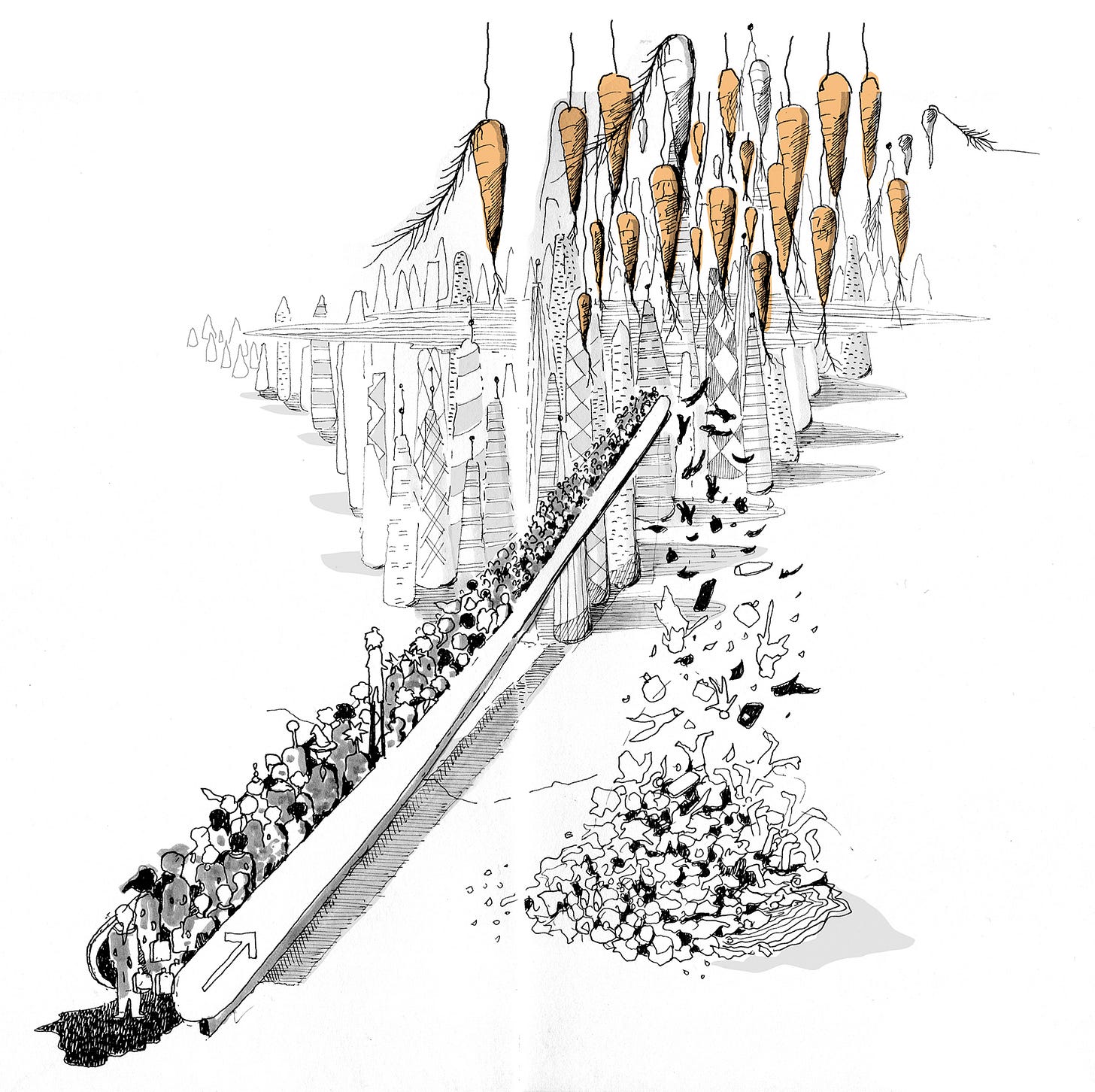In 1872 German physiologist Friedrich Goltz set out to discover the location of the soul. He wanted to prove or disprove the theory of the "spinal cord soul" put forward by another German physiologist Eduard Pflüger, who argued that the soul existed independently of the brain. Goltz's experiment would become famous. He placed a frog in cold water and slowly started to increase the temperature.
We all know the story of the boiling frog. It’s sitting in the water and the water is getting hotter, but it doesn’t notice, it just gets used to it until suddenly it can’t take it any longer and dies. And this inaction to save itself always mystifies people, why doesn’t the frog feel it getting hotter? Why doesn’t it do anything?
What has always been a greater mystery to me is why humans, when we feel the waters around us getting hotter, when work is leaving us drained and burnt out and unsatisfied, when relationships aren’t working, when we feel dead inside, why do we do nothing? The frog can be excused. It’s a frog. But even when people know that the waters are becoming unbearable, we still do not act. Instead, we deny, we make excuses, or we justify doing absolutely nothing to change the situation.
I first met Simon in 2012. We would often see each other at the local sports club of a weekend. A product of English weather, Simon excelled at pub sports; snooker, pool and darts. When I met him, he was working for a company that produced commercial reports for the shipping industry. He had studied Geography at university and I remember asking him how he found his way into the shipping industry. It is a story that has stuck with me.
Not long out of university he had been sharing a house with some friends in Oxford. One of the housemates worked for a company that produced commercial reports for the shipping industry. One day, the housemate asked Simon if he would like to go into the office. They had an important client coming to the office a but with few staff, the office was looking kind of empty. Could Simon come along, sit at a desk and pretend that he worked there? Having nothing better to do, Simon agreed. That was back in 2003. He has worked there ever since.
Not long ago, I was interviewed for a podcast and I was asked how I ended up working in State Government. "Desperation," I answered. It was an honest answer. I had never dreamed of working in Government. There was no long held ambition to be employed at an ASO7 level. The truth was that I had returned from many years living and working overseas, had completed an MBA and then spent six months unemployed, searching for work. Well not the full six months, the last two months I was working behind the bar at my local RSL Club. When the opportunity came to move to Adelaide and work for the South Australian State Government, I jumped at it.
For the four years I was there, I can't recall meeting any person who's dream it was to be working for the State Government. In fact, I can't remember meeting a single person who wasn't applying for jobs somewhere else. And that is the unusual thing about jobs, so often we just kind of end up in our jobs, pushed and pulled by circumstances seemingly beyond our control and once in place, like the boiling frog, we find it very hard to move.
I met Patrizia in Sicily on a day cruise through the Aeolian Islands. She had the easy, sophisticated elegance that seems to be an Italian birth right; well-dressed, polite but warm. Originally from Sardinia she had made her life in Milan. She was travelling with two other ladies of a similar age, and I came to understand that Patrizia’s husband had passed away recently.
As we cruised past the bleached white cliffs of the abandoned pumice mines of Lipari, Patrizia left her friends and came to sit outside on the deck with my wife and I. She asked what we were doing in Italy and as best we could we told her what we were doing in Italy. Patrizia’s response to that was “you’re right to do it now, don’t wait until my age.”
There was a sense of regret in Patrizia’s voice which I have been unable to forget. We were two people doing the exact same trip, but whereas I had my wife by my side, Patrizia had lost her partner. Maybe Patrizia and her husband had waited all their life to take that trip to Sicily together. I’ll never know.
I’ve written previously about loss aversion behaviour first put forward by the Israeli psychologists Daniel Kahneman and Amos Tversky as part of Prospect Theory. “The response to losses is stronger than the response to corresponding gains” is how Kahneman sums up loss aversion. The result is that we prefer to hold on to what we have rather than pursue future potential gains.
However, this doesn’t seem to be the case with time. If the present is all we have, then loss aversion theory would suggest that we would do all in our power to utilise the present, to maximise the now, and we certainly wouldn’t trade it away for an uncertain future gain.
But that is exactly what we do we when dedicate the finite series of moments that constitute our present to activities that provide no satisfaction in the hope or belief that some day, when we retire and take that dream holiday, or when everything falls into place, it will be all worthwhile. But sometimes, someday never comes.
The story of the boiling frog has become an apologue, rolled out whenever a point about the insidiousness of gradual change is needed to be made. But modern tellings omit one rather important fact. The frog that Goltz used in his experiment had been pithed. Pithing is a technique used by scientists whereby the brain is destroyed by the insertion of a small metal rod leaving the animal brain-dead but alive.
Goltz wanted to see if the soul resided outside of brain function, to do so he needed to immobilize the brain. That the frog was brain-dead most likely explains why it didn’t jump out of the increasingly hotter water. When Goltz conducted the same experiment with a frog that had not been pithed, it leapt from the water as soon as it started to heat up.
In light of this information my original question becomes even more pertinent. If even a frog knows enough to jump out of warming waters, why then do we as humans do nothing? Holding on, waiting for a better day, a distant future that is neither promised nor certain?
Maybe it has nothing to do with the water at all. Maybe, by the time we do realise the temperature of the water around us is becoming unbearable we can’t get out, even if we wanted to. The walls of our pots, pots we never chose to be in, pots we thought were only temporary, have grown so high, buttressed by mortgages and school fees and all the other trappings of modern life, that escape is impossible. Maybe the clue is in that phrase, the trappings of modern life.
I met up again with Simon last year. His daughter is now at an age where she is deciding what she will do with her life. Simon’s advice to her should be advice to us all. “Choose to do something you love,” he told her. “It doesn’t matter what. The important thing is to choose. Because if you don’t choose a job, a job will choose you.”
Shout out…
The podcast I mentioned in this week’s post was Not Compliant Enough where I chatted with host Karista Marcinek. We discussed the writing life, working life and why the office is not for me. You can have a listen here:
One last thing
Talented cartographer and artist Alex Hotchin is the pen behind all of my little paragraph breakers that you see in each post, everything from feathers to dogs to me in a little rowing boat. It’s not actually me but I like to think it is.
Anyway, after last week’s post about carrots Alex sent me the drawing below, which she did a few years ago called The Grey People. If I’d known it had existed I would have just posted that. It expresses more clearly what I tried to say in 1400 words. You can see more of Alex’s amazing work here: https://www.instagram.com/alex_hotchin/?hl=en
If you enjoyed this post please hit the heart button, leave a comment or share it with someone you think may enjoy it too. As always, thank you for reading.




















Share this post